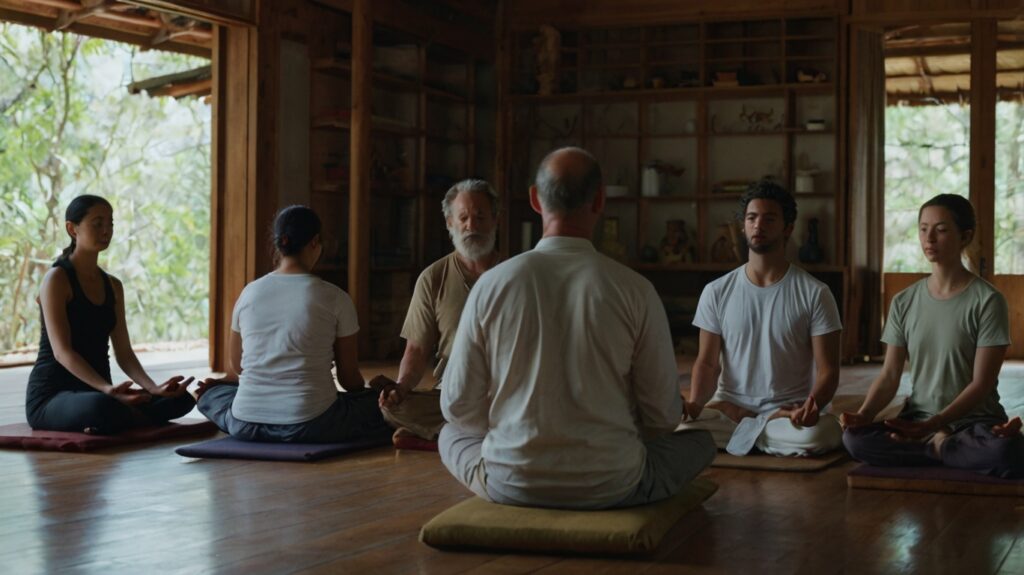Looking to dive deeper into meditation but not sure where to start? Meditation teachers can provide the guidance you need. Whether you’re a beginner or looking to refine your technique, these experienced instructors help you stay focused, consistent, and connected on your journey.
What is a meditation teacher?
Roles and Responsibilities
A meditation teacher isn’t just someone who leads a session—they’re mentors, spiritual friends, and wisdom-sharers. They help you sit with stillness, understand your thoughts, and cultivate awareness.
How They Support Your Practice
They guide you through techniques, adjust your posture, answer questions, and help you explore challenges like restlessness or distraction.
Why Work with a Meditation Teacher?
Personalized Guidance
Unlike apps, a live teacher can tailor guidance to your needs, whether you’re managing anxiety, improving focus, or deepening your spiritual connection.
Accountability and Encouragement
Sometimes all you need is a reminder to sit and take a deep breath. Teachers provide that gentle nudge and celebrate your progress.
Types of Meditation Teachers
Traditional Monastic Teachers
Think of monks and nuns in established Buddhist lineages. They often focus on deep spiritual transformation.

Modern Secular Instructors
These teachers strip away religious language and focus on mindfulness for everyday wellness.
Mindfulness Coaches and Therapists
Often trained in psychology, they blend therapeutic approaches with meditation to help with mental health and stress relief.
Qualities of a Great Meditation Teacher
Compassion and Presence
A good teacher listens deeply, speaks kindly, and holds space without judgment.
Deep Personal Practice
You want someone who walks the talk. Look for a teacher who practices daily and lives mindfully.
Different Meditation Traditions and Their Teachers
Zen Meditation (Zazen)
Focuses on seated posture and awareness. Teachers often emphasize discipline and simplicity.
Vipassana and Theravāda Buddhism
Insight meditation teachers guide students in observing thoughts and sensations non-reactively.
Tibetan Meditation Practices
Rich with visualization and mantra, Tibetan teachers often bring mystical elements to their teachings.
Transcendental Meditation (TM)
TM teachers provide mantras and structured programs, often in a non-religious format.
Mindfulness-Based Stress Reduction (MBSR)
Teachers of MBSR, which was developed by Jon Kabat-Zinn, are trained to assist with everyday stress, pain, and anxiety.
How to Choose the Right Meditation Teacher
Understand Your Goals
Do you want relaxation, insight, or spiritual growth? Match your goals to the teacher’s focus
Check Credentials and Lineage
Especially important in traditional paths. In secular circles, look for certified training and experience.
Assess Compatibility
The vibe matters. You should feel safe, heard, and inspired—not intimidated or confused.
Where to Find Meditation Teachers
Local Studios and Retreat Centers
Check yoga studios, wellness centers, or Buddhist temples.
Online Platforms and Apps
Sites like Insight Timer, Calm, or even YouTube host thousands of live and recorded classes.
Recommendations from Communities
Consult friends or sign up for Meetup or social media meditation groups.

Benefits of Learning from a Teacher vs. Self-Practice
Immediate Feedback
Struggling with your posture or racing thoughts? A teacher can help right away.
Spiritual Growth and Insight
Teachers offer teachings that spark deeper understanding and personal transformation.
What to Expect in a Session
Structure of a Meditation Class
A speaker or reading usually opens the session, followed by a silent or guided meditation and a chance for questions or conversation.
Common Teaching Techniques
Breath awareness, body scans, loving-kindness, or mantra repetition are frequently used methods.
Online vs. In-Person Teaching
Pros and Cons of Digital Learning
Online offers convenience, variety, and affordability. In-person provides more connection and direct support.
Hybrid Models for Flexible Practice
Many teachers now offer both, giving you the best of both worlds.
Cost of Working with a Meditation Teacher
Private Sessions
Based on the teacher’s experience, these can range from $40 to $150 per hour.
Group Classes and Donations
Community classes are often donation-based, especially in spiritual or Buddhist settings.
Famous Meditation Teachers to Know
Thich Nhat Hanh
A global peace activist and Zen master. His mindfulness lessons are insightful and easy to understand.
Jack Kornfield
One of the founders of Soul Stone Meditation Position and one of the first people to learn Western Buddhism.
Sharon Salzberg
Known for loving-kindness (metta) meditation. Her books and talks are incredibly beginner-friendly.
Pema Chödrön
A Tibetan Buddhist nun known for her down-to-earth wisdom on suffering, healing, and compassion.
How to Become a Meditation Teacher
Training and Certification
Course lengths vary from a few months to a number of years. Look for respected institutions like MBSR, Mindful Schools, or traditional Buddhist centers.
Deepening Personal Practice
Before you guide others, you need to walk the path yourself—daily meditation, retreats, and study are key.
Conclusion
Meditation teachers are more than instructors—they’re companions on your inner journey. Whether you’re meditating for stress relief, self-discovery, or spiritual awakening, the right teacher can make all the difference. They meet you where you are and gently point you toward where you want to go—calmer, clearer, more connected.

FAQs
1. Do I need a teacher to meditate effectively?
No, but a teacher can accelerate your progress, help with blocks, and offer spiritual insights.
2. How do I know if a meditation teacher is legit?
Check their training, experience, reviews, and how you feel in their presence.
3. Can I switch teachers if it’s not working out?
Absolutely. Trust your gut. The right teacher will feel supportive and aligned with your path.
4. What separates a teacher from a mentor?
Teachers often focus on spiritual or traditional methods. Coaches may blend mindfulness with performance goals or therapy.
5. Is online meditation teaching effective?
Yes! Many people have transformative experiences through virtual classes and apps.










